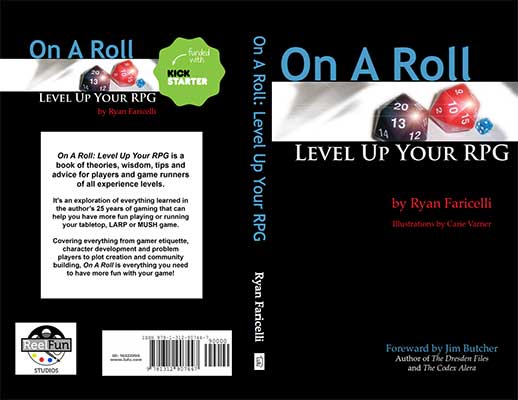Review: On a Roll – Level Up Your RPG
Summary
On A Roll: Level Up Your RPG conveys a wealth of hard-won knowledge about how the social interaction of roleplaying can make or break the games we play, and about how to be a better player and gamemaster (storyteller in the book’s parlance). If roleplaying games are an important part of your life and you wish you were having more fun playing them, you owe it to yourself to read this book.
Check Your Investment

This 260 page book is most suited to experienced tabletop, LARP (live-action), and MUSH (text-based) role-players. It addresses three main topics: playing better, running better games, and caring for a sustainable roleplaying community. The vast majority of the book is directly applicable to tabletop roleplaying. I read the PDF version, provided by the author for review.
Over the course of a twenty-five years of roleplaying and involvement in several roleplay-related organizations, Ryan Faricelli found that he had “lost sight of it just being a game.” This realization prompted him to examine which aspects of roleplaying were giving him joy, and which were stressing him out. The result is a thorough, candid work heavily focused on the human aspects of play.
Faricelli’s central thesis is that the trick to enjoying roleplaying as a hobby is to maintain perspective (“check your investment”), and remember that the point of it all is to have fun. This seems like a message from Captain Obvious until Faricelli rolls out disturbing accounts like this one:
Over the course of a few emails exchanged, he made it quite clear that I was a terrible friend for breaking my word and not calling him about his role-playing game while I was at the hospital with my wife’s miscarriage.
Not all of the insights in On A Roll are particularly novel, but Faricelli’s personal anecdotes – some of them surprisingly candid – about the social dynamics of gaming make it clear that he didn’t arrive at his conclusions through abstract analysis. This practical foundation adds weight to his advice.
It’s easy in the endless forum chatter and game reviews and edition wars to forget that roleplaying games are inherently social endeavors. Whether it’s a tabletop, live-action, or computer-enabled game, roleplay doesn’t happen without people. Faricelli never loses sight of that, reminding the reader how ego can get in the way of good roleplaying in ways large and small.
There are also pieces of more prosaic advice for players and storytellers alike, the kind that derive from years of play. For example:
If you are an experienced storyteller and you have been running the same game for years, I recommend you, too, go back and reread the books once more. I ran a LARP using the same system for nearly ten years, and in my eighth year a brand new player noted that something didn’t actually work the way myself, my storytelling team and all of the games in our LARP organization ran it. No one had actually house ruled the game mechanic, we just had all been running it wrong for so many years, that we assumed it was how it actually worked.
For those involved in managing a roleplaying community, he advises keeping the drama in-game, where it belongs:
The great thing about building a community of gamers is that you’ll discover that they begin to support one another, and as you develop a feeling of safety and kindness in your community, a lot of the annoying drama that happens out-of-character begins to go away. Even better, communities look out for one another and fight to keep that kind of drama out of their community.
A few of Faricelli’s ideas may rub some readers the wrong way, for example the declaration that “the ability to accept ‘no’ as an answer is an important skill for players to have.” But he doesn’t toss out unsubstantiated opinions; he supports them with solid reasoning backed up by experience.
Nits
At times On A Roll reads like a tale of how gaming can go wrong, of how people can get so invested in games as a vehicle for the ego that they lose sight of the human side of games. This makes the text feel like a lesson primarily in what not to do, rather than what to do. The candor is appropriate, but it is a bit like taking your medicine – you know it’s good for you, but you’re sometimes left with a slightly sour aftertaste.
On A Roll could also use another editing pass, as there are more than a few distracting grammatical nits. The book is formatted essentially an extended essay, with no sidebars or other visual relief, and the small number of images inserted at chapter heads look hastily-sketched and don’t do justice to the text.
Final Thoughts
While the presentation could use a tune up, On A Roll is filled with insight and practical counsel. It should be on every roleplaying group’s reading list.
Purchasing Information
On A Roll: Level Up Your RPG, by Ryan Faricelli, ReelFun Studios, 2015
The book is available in paperback at Lulu.com.
Ω